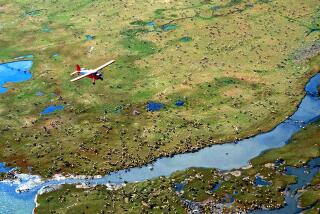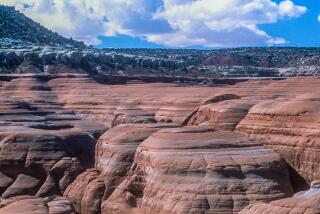Mr. President, Take a Look at Brushy, Ky.
- Share via
I wish that I could sit down and talk with President Bush about his policy for our national forests, which puts less emphasis on the natural health of our wild lands and favors fewer rules for drillers, loggers and miners.
If I could speak to the president, I would say:
I am an artist who was born in Appalachia. Today, I make my home next to California’s Los Padres National Forest. Daily, I look in one direction at the natural beauty of the mountains and in the other direction at the blight of oil rigs. Daily, I feel the consequences of life in a country addicted to oil.
But to understand my concern about your plans for America’s landscape, I’d like to tell you about what has happened to my homeland mountains of Appalachia.
For more than two years, my art work has been focused back in the coal mining country of Kentucky, where I still have family. You might want to fly down from D.C. for half a day and take a look at the condition of those mountains after years of surface mining.
I could show you my photographs, film footage, etchings and poems that tell the story of the people and mountains of a remote area called Brushy in eastern Kentucky. But, really, you should see for yourself. What I have seen has changed my heart and my mind about our forests and our appetite for coal, oil and other fuels.
When you get to the top of Brushy’s Ford Mountain, don’t look for ridges and peaks. Most have been blasted away. Their remains poke up in the landscape here and there like snaggled teeth.
The first time I viewed surface coal mining in progress there--sprawling over nearly 300 acres of scarred outcroppings, uprooted hardwoods and muddy black access roads--it was difficult to believe I was in my own country.
Like me, you will wheeze from the grit and diesel smoke from coal trucks, drilling and blasting. You will be able to stand in one spot, scan the strangely level horizon and count seven mountains with tops sliced off and smoothed over. Should you fly low along the Kentucky-West Virginia border, you will see how whole stretches of that part of Appalachia could be mistaken for a blitzed war zone.
On these mined mountains, don’t expect to see trees, topsoil, spring-blooming bushes or delicate native grasses. Animals are just as scarce. You will be puzzled by the hollows, referred to as “hollers” in these parts. Small valleys they are no more. They are filled with crumbled mountaintops. Their streams are rock ditches draining into stagnant holding ponds.
All this cleared land with its expansive vistas may lead you to think of golf courses or housing developments. But not many people around Brushy are golfers, nor can they afford that kind of housing. They need jobs at the mines. But earth-moving and earth-hauling machines the size of city buildings do most of the work now.
When you go down off the mountain to meet the people who live along the upper and lower forks of Brushy Creek, you will not hear them complain about their smelly well water or about black lung and cancer deaths or about the cracks in their walls from the blasting. You won’t hear them talk about how their only roadway has been torn apart by mammoth coal trucks. This is their way of life. Most of them are of Scots-Irish families that have survived in these and similarly difficult conditions for more than three centuries. All they want is to make a decent living to support their families.
What I ask, Mr. President, is that you keep in mind what you would see there: hundreds, even thousands, of square miles of leveled mountains, barren ridgelines, filled valleys and crumbled public roadways. Then ask yourself: Will the policy changes I want for our public lands lead to more of this?
It is possible you would return to Washington from Brushy knowing that more needs to be done, for the people, for the mountains, for the communities, for all of us.
More to Read
Sign up for The Wild
We’ll help you find the best places to hike, bike and run, as well as the perfect silent spots for meditation and yoga.
You may occasionally receive promotional content from the Los Angeles Times.






